With smartphones almost entirely replacing handheld consoles for gaming, the best gaming phone is an important consideration for many. Such phones often have excellent screens and plenty of power, while the App Store and Google Play Store both have a large and ever growing selection of games. Consoles like the Nintendo Switch might be superior in many ways, but they won't fit in your pocket and go wherever you do.
However, not all smartphones are good for games, and there’s more to consider than just raw power, though that’s certainly a big factor.
There are phones like the Asus ROG Phone 5, Lenovo Legion Phone Duel, and Nubia Red Magic 5G, which are all built specifically with gaming in mind, meaning they have things like extra high refresh rates, touch-sensitive triggers, cooling systems, and more. They can make calls and use apps like normal phones, but their perks make them geared toward long-lasting gaming session.
On the other hand, there are also excellent mainstream phones that are also good for gaming. Many top flagships like theiPhone 12 Pro and OnePlus 9 Pro perform a superb job, thanks to their stunning screens and high-end specs.
We’ve included all the best options below, ranked from best to worst, but you’ll find those designed specifically for gaming at the top, with standard handsets that happen to be good for gaming further down.
Make sure to check back regularly too, as we’re keeping this article constantly updated with new arrivals.
Once you’ve picked your phone we’ve got you covered when it comes to picking games as well, with our best iPhone games, best free iPhone games, best Android games and best free Android games lists – all of which are regularly updated.
Best gaming phones 2021
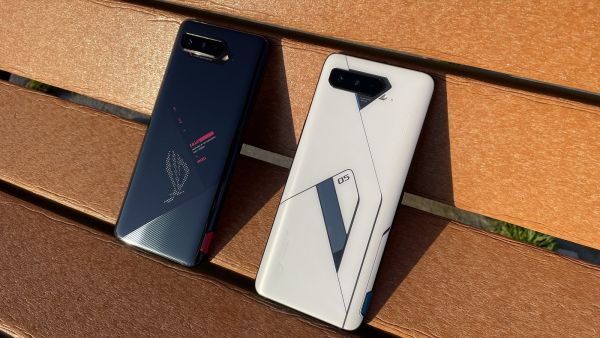
The Asus ROG Phone 5 is a remarkable gaming phone – one which improves on the already-impressive Asus ROG Phone 3.
Its highlights include class-leading power from the pairing of a Snapdragon 888 chipset and up to 16GB of RAM, plus a screen that has a refresh rate of 144Hz and a touch sampling rate of 300Hz – both of which are higher than most phones and beneficial to games.
That screen is big too, and it’s backed up by dual front-facing speakers, which are among the best you’ll find on a phone.
The Asus ROG Phone 5 also has a huge 6,000mAh battery, so you can game for longer, and with 65W charging you won’t be out of action for long when it runs dry.
Add to that responsive shoulder buttons, programmable RGB lights, and compatibility with a range of gaming-focused accessories, and the Asus ROG Phone 5 really is the complete package for gamers.
It’s not quite an all-round flagship (its cameras don’t excel as much as the rest of the hardware for a start) but if gaming is your priority then this phone should be at or near the top of your list.
Read our review: Asus ROG Phone 5

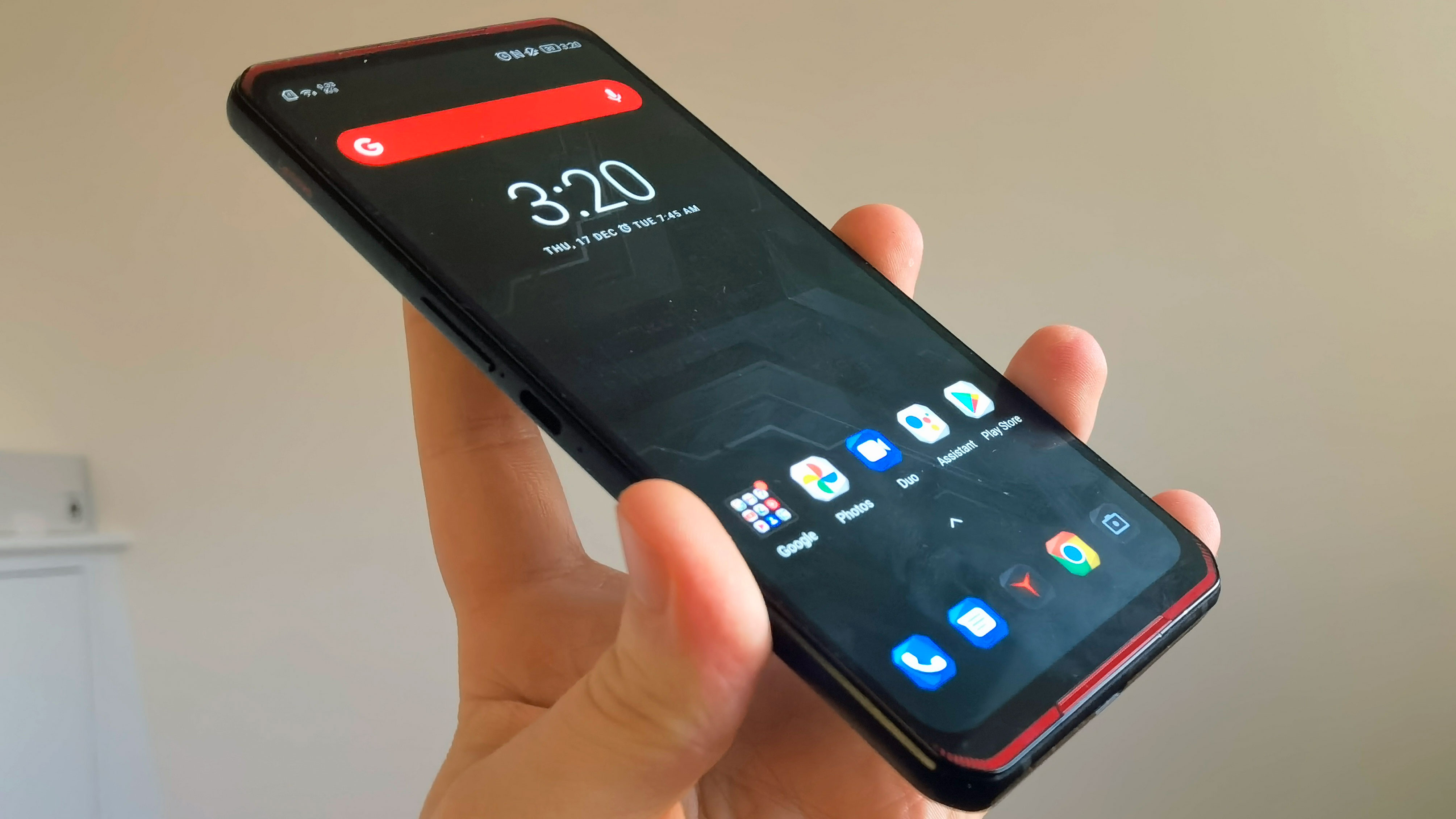
The first gaming phone from Lenovo, the Legion Phone Duel, matches great gaming-dedicated features with some other top specs and features.
The phone supports 90W fast charging, and has a pop-up camera so the screen remains unbroken. It's also got a top processor and software optimized for use in landscape mode. All of these contribute to make it great for gaming.
Our issues with the phone don't touch its gaming prowess, though its high price, software issues and mediocre camera might affect some.
If you're looking for one of the best gaming phones right now, this is up there; if you're looking for a great smartphone that is also good for playing games, this is a good choice, though you should check the others on this list before buying.
Read our review: Lenovo Legion Phone Duel

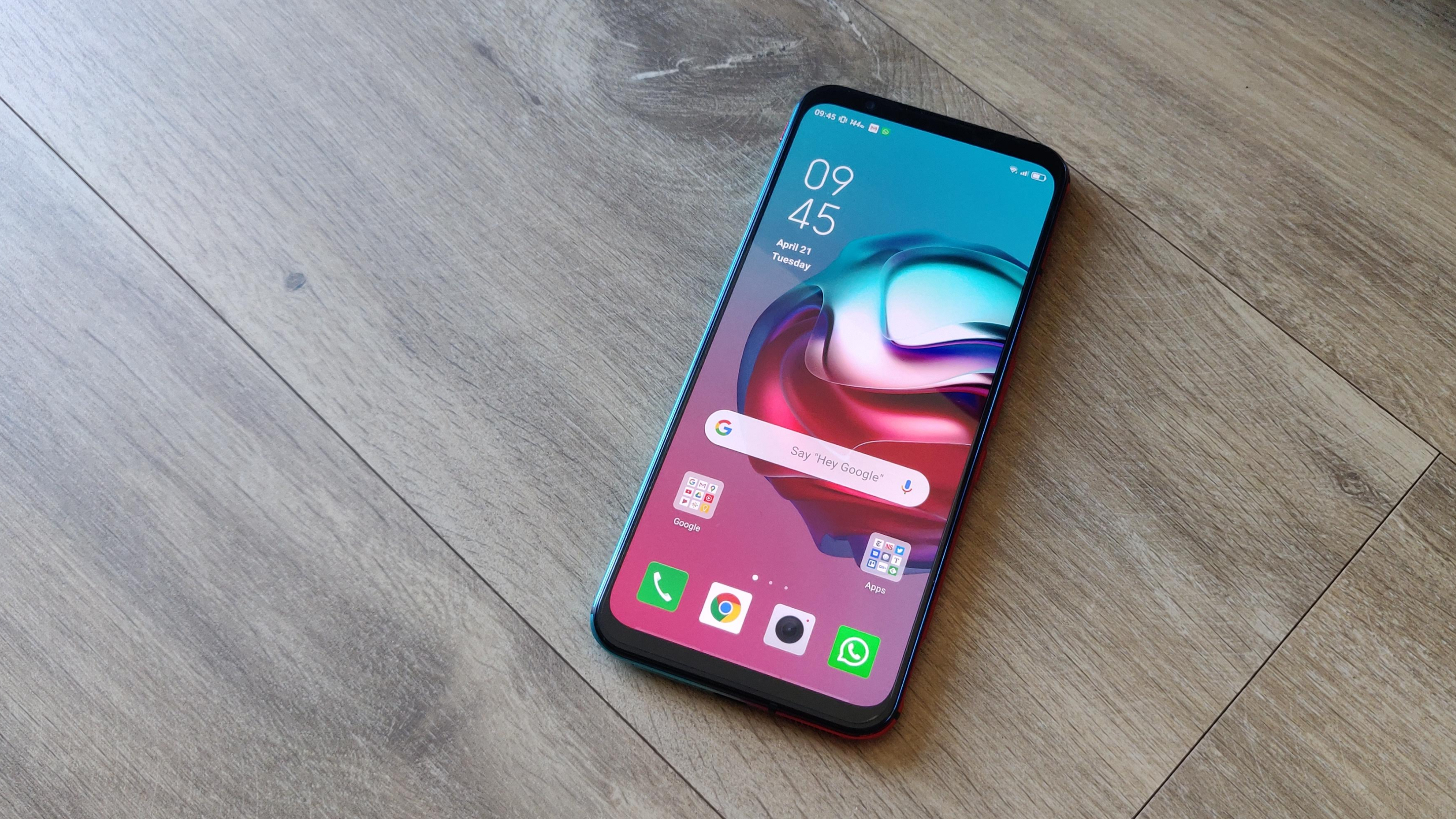
The Nubia Red Magic 5G has the world’s first 144Hz smartphone screen, which makes it ideal for gaming, as that’s a silky smooth refresh rate.
But that’s not the only thing that makes this ideal for gaming. In fact, it’s designed specifically for this pastime, with shoulder triggers to give you increased control, a fan and a liquid cooling system to keep the handset cool under pressure, a dedicated ‘Game Space’ to let you customize your gaming experience, and a ‘4D Shock’ feature that adds vibration to games.
That last feature isn’t supported by many titles at the time of writing, and nor is the 144Hz display, but if game developers embrace them then this could be one seriously future-proofed phone.
It also supports 5G of course, and has plenty of power. It’s only let down slightly by a 1080 x 2340 screen, which isn’t among the sharpest around, along with some software bugs and a design that will prove divisive.
Read our review: Nubia Red Magic 5G

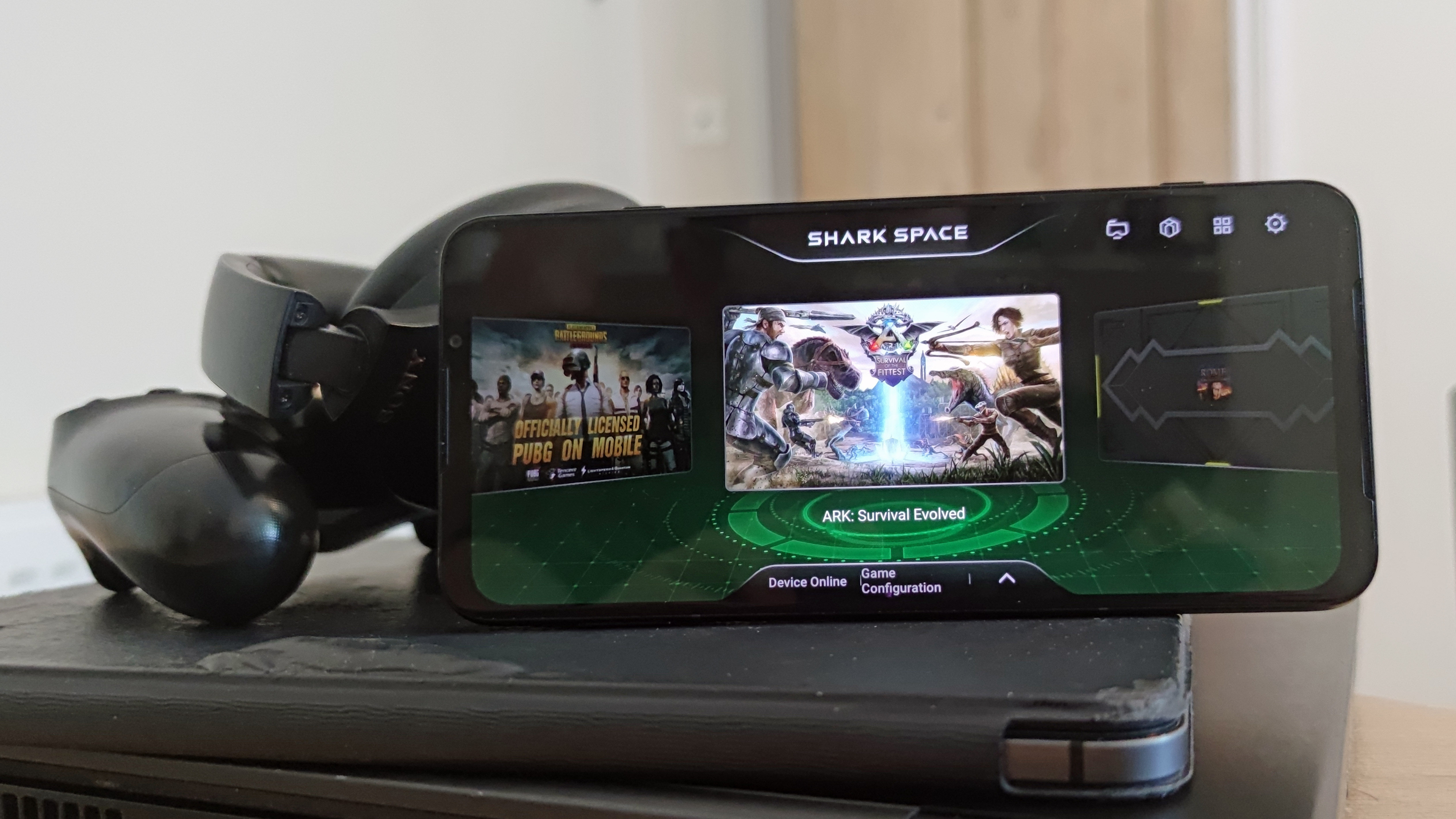
The Black Shark 3 is the best gaming phone from the Xiaomi sub-brand, although it doesn't quite beat its contemporary gaming phones from a few other brands.
The phone is big, bold in design and has LED lights, and its specs are all what you'd expect from a gaming phone - in that, they're top-end. The cameras were surprisingly effective too, especially in low-light settings, though sometimes the optimization could be overzealous.
The reason this phone isn't higher is thanks to its 90Hz refresh rate, which is lower than the other phones higher on this list, and that it doesn't have as many dedicated gaming features as the others either.
Read our review: Black Shark 3


The first Razer Phone was a solid first effort to bring the gamer-specific brand to a mobile device, but it had a few shortcomings that dropped it further down our list. The second version has addressed some and come out with a stronger device for it, though it's still aimed primarily at gamers.
What does that mean? The camera and display aren't nearly as impressive as other phones that cost this much, so casual gamers might want to look elsewhere. But if you're more serious about mobile gaming and can afford it, this is a solid choice.
Outwardly, the Razer Phone 2 hasn't changed much from its predecessor, though it's upgraded to the Snapdragon 845 chip and switched to a glass back for Qi wireless charging. It's also added a slick vapor chamber to cool the device as you game.
At the end of the day, the phone's beefy chipset, 8GB RAM, great speakers, 120hz refresh rate screen and 4,000mAh battery, as well as extensive settings to tweak battery life and performance, make this a great choice for gaming.
Read our review: Razer Phone 2

The best non-gaming phones for gaming
We've suggested the best phones designed for gaming, but if you'd rather have a more mainstream device, here are all the phones we recommend that, among the rest of their strengths, are also very good phones to play games on.
You'll find a lot of overlap with our best phones list, for good reason: these handsets have top-end specs and screens to give the best gaming experience possible outside of gaming-focused phones.
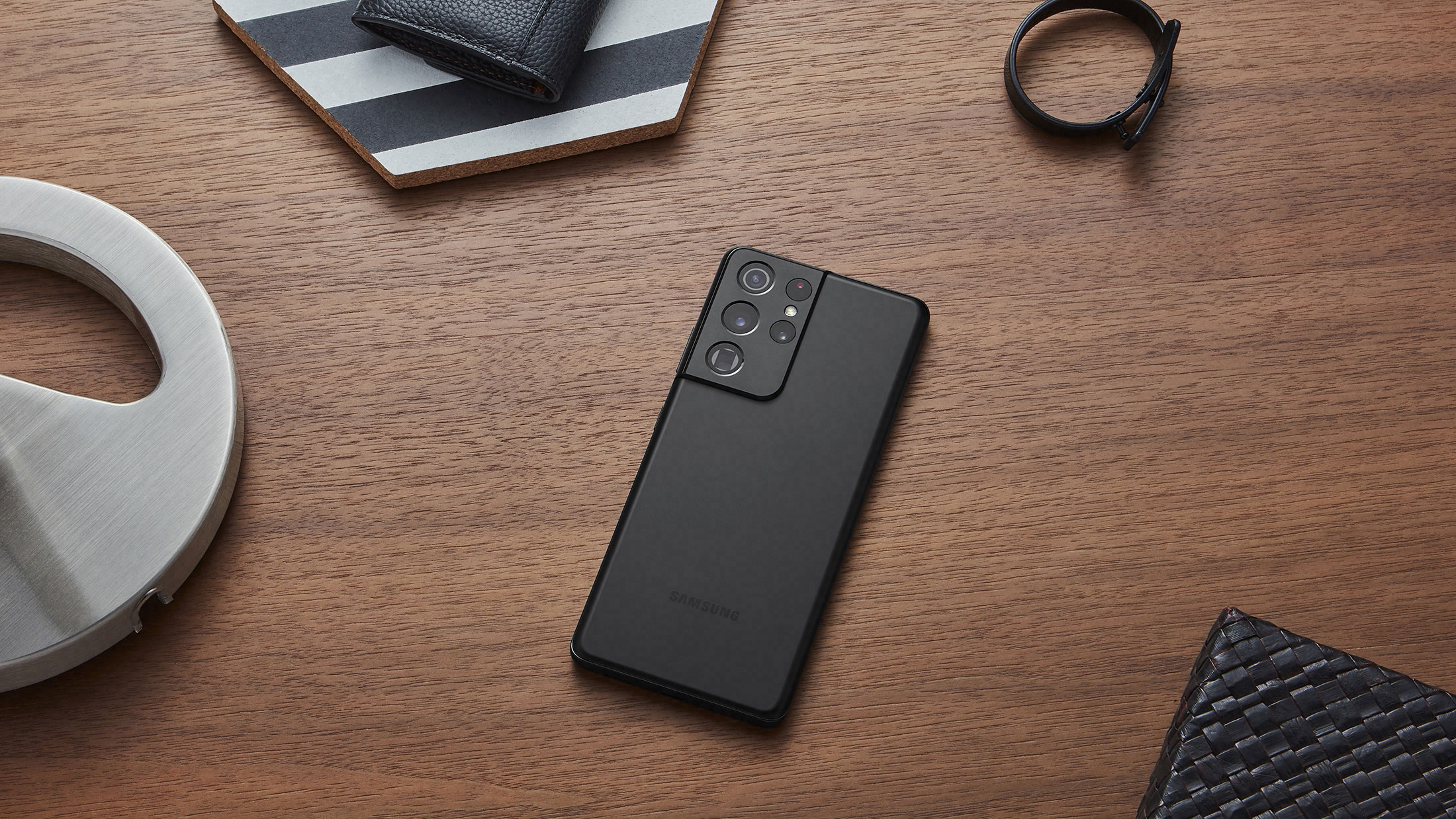
If you're looking for a phone that's great for gaming, and many other things besides, the Samsung Galaxy S21 Ultra is a good choice. It's Samsung's latest top-tier flagship phone, with specs taken up to 11 across the board.
Our main issue with this phone is the reason many people won't buy it - the price. It's an incredibly expensive smartphone and few people will even be able to consider buying it.
If the Galaxy S21 Ultra fits in your budget, though, you'll find it great for gaming with top processing power, and a large, good-looking screen. The top camera smarts are just an extra.
Read our review: Samsung Galaxy S21 Ultra

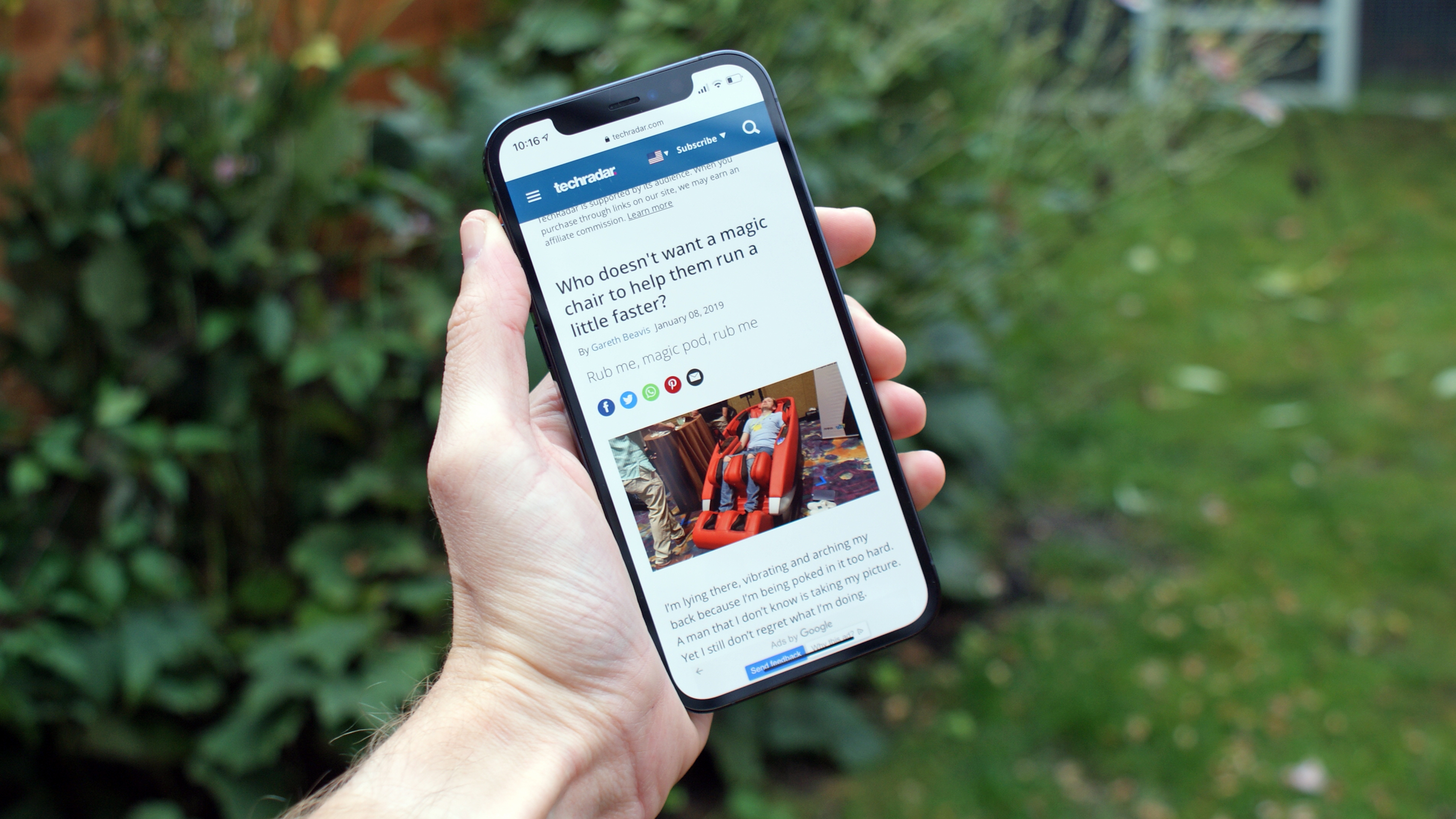
The newest and best iPhone Pro model out there, the iPhone 12 Pro is the best of the Apple bunch right now. Its 6.1-inch display looks fantastic and is just the right size to get the most out of your gaming experience. Backed up by a powerful processor and plenty of storage space, you won't be disappointed by how speedily games run.
There's also no shortage of game options thanks to the App Store having a huge wealth of games available to it, plus the benefits that come from using Apple Arcade for a Netflix-style library of options.
The iPhone 12 Pro is expensive for what you get and 5G isn't really relevant to a lot of users just yet (but will be a huge help gaming in future), but such a purchase will mean that you're future-proofed for a while to come yet.
Read our review: iPhone 12 Pro

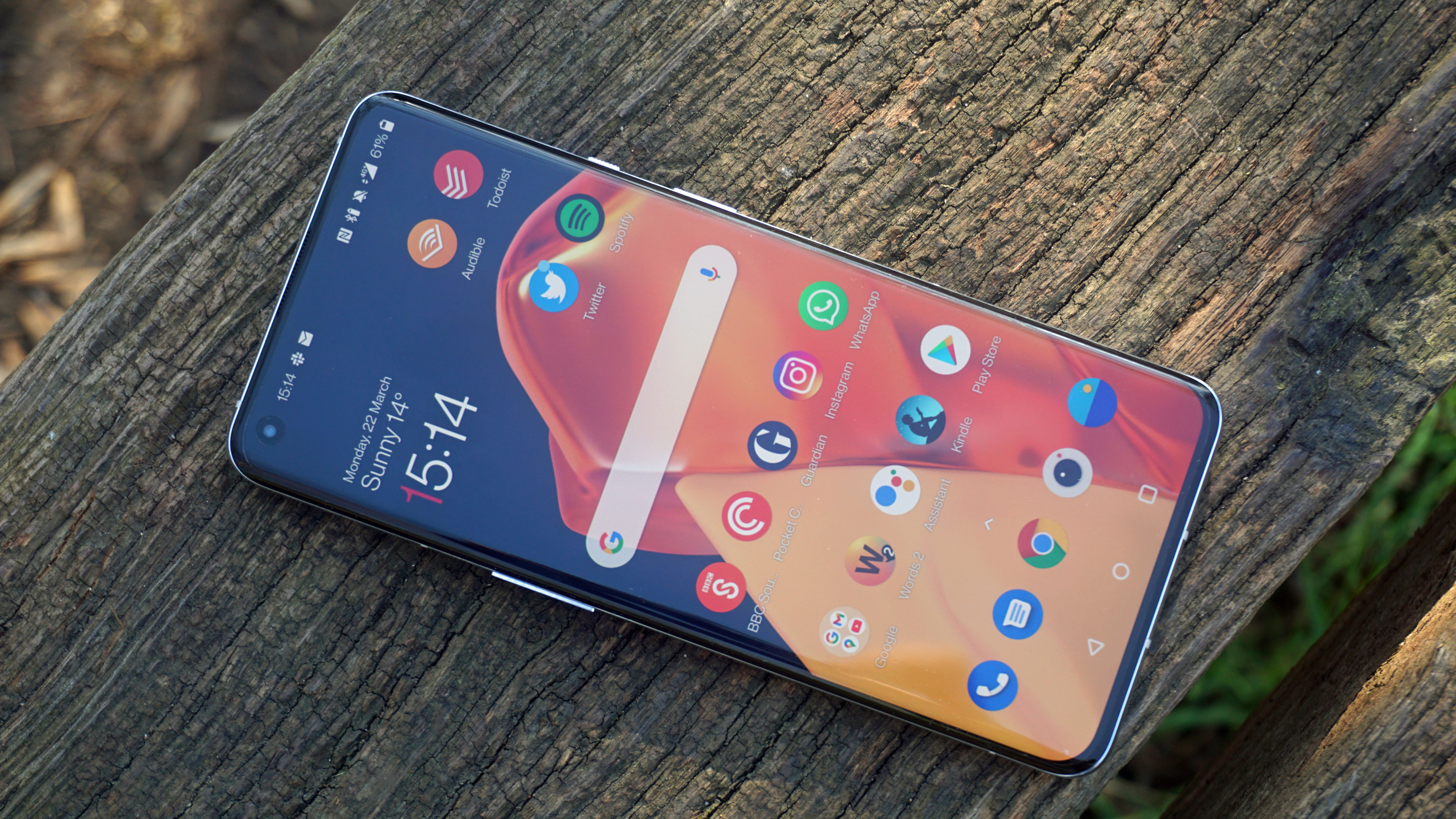
The OnePlus 9 Pro is a great all-round flagship, but it also has a feature that we’d more expect to find on a gaming phone. We’re talking about Hyper Touch, which can boost the touch sampling rate from an already-high 240Hz to 360Hz, making the screen extraordinarily responsive to inputs – which is ideal when playing games.
Beyond that, the OnePlus 9 Pro also has all the power you should need for gaming, with a high-end Snapdragon 888 chipset and up to 12GB of RAM. And games are sure to look great on its 6.7-inch 1440 x 3216 AMOLED screen with a refresh rate of up to 120Hz.
It also supports 65W charging (and 50W wireless charging), so you’ll never be out of juice for long, and with 5G you can game online on the move.
There’s also up to 256GB of storage, so there’s plenty of room to store all your games on the OnePlus 9 Pro.
Read our review: OnePlus 9 Pro

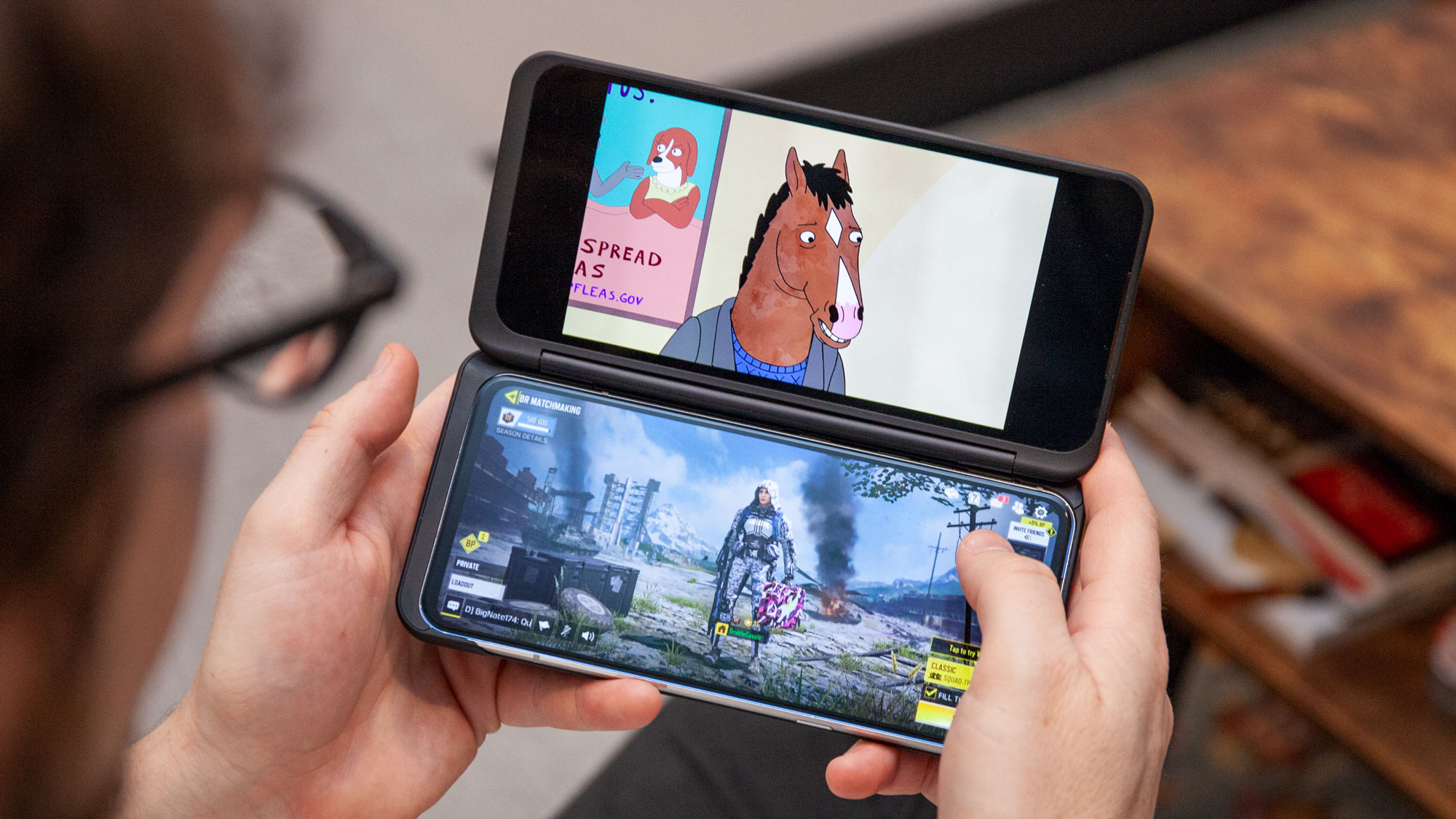
The LG V60 ThinQ seems like an updated and up-sized version of the LG G8, which popularized the Dual Screen peripheral that makes the V60 stand out from the competition.
In essence, the Dual Screen is an exact copy of the V60's 6.8-inch Full HD Plus (2460 x 1080) display. The software takes a moment to get used to, but you can effectively have two apps running at the same time – handy if, like in the photo above, you want to play games on one screen and watch media on the other.
There is a gaming mode that makes the second screen an input touchpad, leaving the first screen free of fingers, but it's not the most intuitive. There are also a handful of apps, like Google Maps, that can splash across both screens to varying degrees of helpfulness.
Otherwise, the phone is a typically powerful flagship for 2020: Snapdragon 865 chipset, 8GB of RAM, 128GB or 256GB of storage, and it runs Android 10. The 5,000mAh battery is a great addition to keep your gaming going, and the 3.5mm headphone jack is a rarity in phones these days. Overall, a strong pick for gaming and watching media – or both at the same time.
Read our reviews: LG V60 ThinQ review

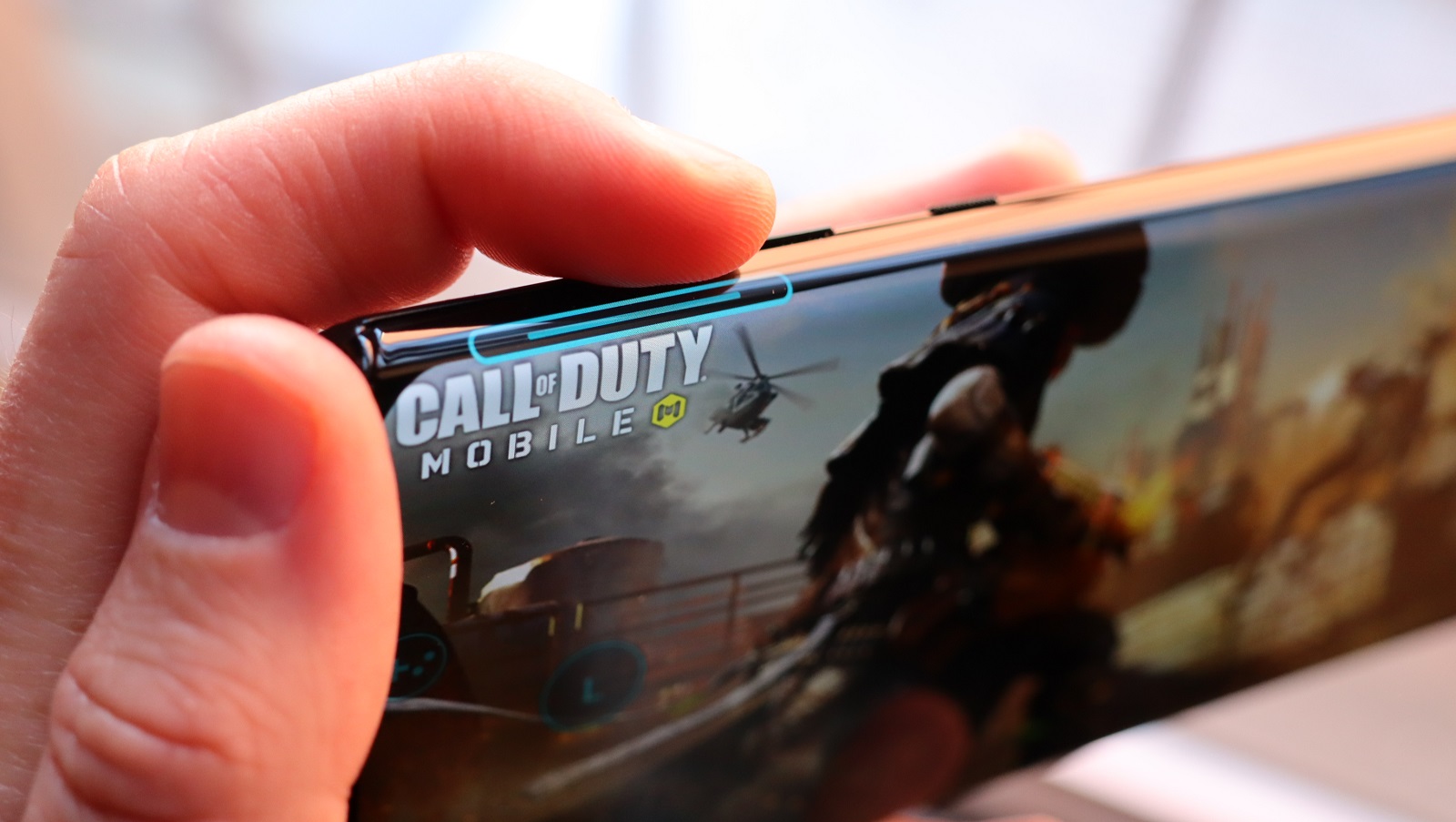
The Motorola Edge Plus is the first top-tier flagship Motorola has released in years, and in many ways, it was worth the wait: the waterfall display is big and gorgeous, the phone packs great specs, and there's even a new gaming feature thrown in: digital trigger buttons that hang over the screen's edge, just under your fingers.
The phone packs an impressive specs array: a Snapdragon 865 chipset, 12GB of RAM, and 256GB of storage (sadly not expandable). The 6.7-inch display has a 90Hz refresh rate and HDR10+ support, giving a far sharper image than we'd expect from its Full HD Plus (2340 x 1080) screen. And its triple rear camera is headed by a staggering 108MP shooter.
While the Motorola Edge Plus' price is about equal to other flagships at $999 (around £800 / AU$1,550), you might have trouble finding it given its limited availability: even in the US, it's only available through Verizon.
The phone's cheaper sibling, the Motorola Edge, has a few compromises in specs and but it's notably cheaper as a result, starting at £549 / $699 (about AU$1,015). And yet, it may be available in more places, and still retains many of the best features of the Edge Plus.
While the Motorola Edge 'only' has a display supporting HDR10, a Snapdragon 765G chipset with 6GB of RAM, a 64MP main shooter, and a smaller 4,500mAh battery, those aren't dealbreakers for the lower price, in our opinion. Plus, the Edge's 128GB of storage is expandable via microSD.
And best of all, both versions come with 3.5mm headphone jacks.
Read our reviews: Motorola Edge Plus review | Motorola Edge review
- Apple Arcade: an overview of Apple's gaming service
- The best iPhone games
- The best Android games
source https://www.techradar.com/news/best-phone-for-gaming/
0 Comments:
Post a Comment